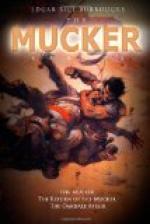“I’d a-hated myself if I’d thought that I could ever talk mushy like I am now. Gee, Bridge, but I was the limit! A girl—a nice girl—called me a mucker once, an’ a coward. I was both; but I had the reputation of bein’ the toughest guy on the West Side, an’ I thought I was a man. I nearly poked her face for her—think of it, Bridge! I nearly did; but something stopped me—something held my hand from it, an’ lately I’ve liked to think that maybe what stopped me was something in me that had always been there—something decent that was really a part of me. I hate to think that I was such a beast at heart as I acted like all my life up to that minute. I began to change then. It was mighty slow, an’ I’m still a roughneck; but I’m gettin’ on. She helped me most, of course, an’ now you’re helpin’ me a lot, too—you an’ your poetry stuff. If some dick don’t get me I may get to be a human bein’ before I die.”
Bridge laughed.
“It is odd,” he said, “how our viewpoints change with changed environment and the passing of the years. Time was, Billy, when I’d have hated you as much as you would have hated me. I don’t know that I should have said hate, for that is not exactly the word. It was more contempt that I felt for men whom I considered as not belonging upon that intellectual or social plane to which I considered I had been born.
“I thought of people who moved outside my limited sphere as ‘the great unwashed.’ I pitied them, and I honestly believe now that in the bottom of my heart I considered them of different clay than I, and with souls, if they possessed such things, about on a par with the souls of sheep and cows.
“I couldn’t have seen the man in you, Billy, then, any more than you could have seen the man in me. I have learned much since then, though I still stick to a part of my original articles of faith—I do believe that all men are not equal; and I know that there are a great many more with whom I would not pal than there are those with whom I would.
“Because one man speaks better English than another, or has read more and remembers it, only makes him a better man in that particular respect. I think none the less of you because you can’t quote Browning or Shakespeare—the thing that counts is that you can appreciate, as I do, Service and Kipling and Knibbs.
“Now maybe we are both wrong—maybe Knibbs and Kipling and Service didn’t write poetry, and some people will say as much; but whatever it is it gets you and me in the same way, and so in this respect we are equals. Which being the case let’s see if we can’t rustle some grub, and then find a nice soft spot whereon to pound our respective ears.”
Billy, deciding that he was too sleepy to work for food, invested half of the capital that was to have furnished the swell feed the night before in what two bits would purchase from a generous housewife on a near-by farm, and then, stretching themselves beneath the shade of a tree sufficiently far from the road that they might not attract unnecessary observation, they slept until after noon.




